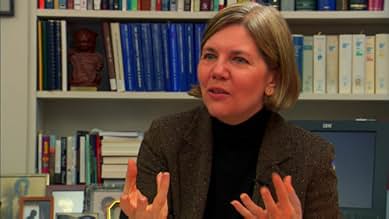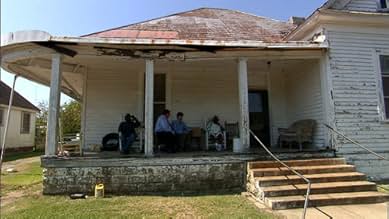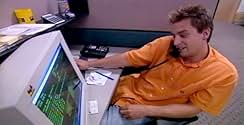Adicionar um enredo no seu idiomaWhen Hurricane Katrina ravaged America's Gulf Coast, it laid bare an uncomfortable reality-America is not only far from the world's wealthiest nation; it is crumbling beneath a staggering bu... Ler tudoWhen Hurricane Katrina ravaged America's Gulf Coast, it laid bare an uncomfortable reality-America is not only far from the world's wealthiest nation; it is crumbling beneath a staggering burden of individual and government debt. Maxed Out takes us on a journey deep inside the Am... Ler tudoWhen Hurricane Katrina ravaged America's Gulf Coast, it laid bare an uncomfortable reality-America is not only far from the world's wealthiest nation; it is crumbling beneath a staggering burden of individual and government debt. Maxed Out takes us on a journey deep inside the American debt-style, where everything seems okay as long as the minimum monthly payment arri... Ler tudo
Avaliações em destaque
But what the film does is explain how the banks and financial institutions have preyed upon the masses, especially the lower income families and young people who don't have a good understanding of how to manage money.
You'll see how families have been ruined by credit card debt and how insidious this game has gotten. If anything, this movie will make you question why we don't teach every child in America how to manage their money before they graduate high school so that they don't get caught in the credit card trap.
I think this movie is a must see for everyone, so they can understand why 10 percent of our society holds 2/3 of all the wealth in America and why the rest of us in the 90 percent can't seem to get ahead!
This movie opened my eyes to how many of these credit giants prey on the uninformed and manage to make money through bankruptcies.
Someone charges $1000, makes a payment then goes delinquent. The late penalties cause that to become $3000, then after 180 days the bank writes that debt off and sells it at 50% to a debt collector for $1500. The bank still collects their principal, plus whatever payments the original person made, plus $500, plus takes a write off. It seems like a no brainer to hand money out like paper.
When a predator offers candy to a child, do we blame the child for taking the sweet bait? No, because the child didn't know better. So are these people at fault?
James D. Scurlock, the writer and director of the film, brings us one heartbreaking story after another about ordinary average citizens who have fallen victim to this consumer-credit nightmare. Some are struggling working-class folk who were scammed by debt-consolidation lenders into believing that they would be paying lower interest rates and payments on their loans, only to discover that their new rates and payments were, in reality, astronomically higher. Others are 18 year-old college students, who, it turns out, are prime targets for credit card companies who see these "bad risks" as gold stars in their corporate profit ledgers. Lending institutions also go after people who have previously filed for bankruptcy, knowing that such individuals are not only spending-prone by nature but legally unable to file for bankruptcy a second time. Scurlock also interviews debt-collectors who seem all but indifferent to the plight of those they are going after, as well as more humanistic economists who understand completely the depth of the problem.
Perhaps the most damning criticism is leveled at politicians like George W. Bush and the members of Congress who passed the ironically named Bankruptcy Abuse Prevention and Consumer Protection Act of 2005, making it much harder for the average American to escape his consumer debt burden and much easier for irresponsible creditors to hound their debtors sometimes literally to death, a point Scurlock brings home when he interviews people whose loved ones have committed suicide as a result of their financial and debt-related woes. Yet, ironically, the film also shows the flippant attitude government officials seem to adopt regarding the nation's own debt situation as trillions of dollars of red ink spill unimpeded across the nation's treasury.
In terms of style, "Maxed Out" lacks the pizazz and showmanship of a Michael Moore expose, but Scurlock's single-minded passion still shines through loud and clear. This is a fairly straightforward talking-heads documentary that cuts to the heart of the problem with compassion and precision. The director does provide some much needed levity, though, by showing us snippets of a very funny standup comedy routine on the subject by Louis C. K., as well as excerpts from a typically cheesy 1960 instructional short entitled "The Wise Use of Credit" (the DVD contains the full ten-minute version of the film in the "Extra Features" section).
"Maxed Out" is another in a long line of documentaries seemingly designed to make one feel insignificant and powerless in the face of hugely impersonal corporate forces. Yet, if knowledge itself is power, then movies like "Sicko," "Enron: The Smartest Guys in the Room," "Maxed Out" etc. may, in their own small way, help lead to much-needed reform and change in the way the government and Big Business deal with the least of us in society. Let us hope that is the case.
I think many of us know the answer but simply refuse to acknowledge it: we want to keep up with the Jones'. They have a new car, we need a new car. They have a new washer/dryer, we need a new one. It is a cycle being perpetuated by the credit industry and we, the consumers, have been drawn to it like moths to a flamethrower.
Maxed Out gives us insights that should make one angry and fearful. Predatory lenders like MBNA, Capitol One, and other credit card companies target those that are least likely to be able to afford credit. Why? Because these are the people who max out their cards then pay the minimum monthly amounts until ...either bankrupt or death do them part. It's a marriage made in Hell and it continues to this day. College students who enter a new campus are likely to find tables set up near their dorms offering sign ups for new credit cards. Why? Again, because they can't afford it (sadly these are the people who end up in the worst situations, often dangling from their necks in dorm room closets).
Add to this fact that we are now in the worst financial/debt crisis in U.S. history (end of 2008) and is there any wonder why? George Bush and his buddies at MBNA passed a new law that puts tighter restrictions on filing for bankruptcy, making those who really need assistance the least likely to get it (but it's okay to spend 700 billion taxpayer dollars to bail out banks that caused this debacle). Heinous. And do the credit card companies have to answer to anyone? Morally or ethically? Not that I've seen.
This is a documentary well worth your while. And at a quick 89 minutes, it won't eat up a lot of your precious time ...like those credit card bills will.
to have "things" no matter what the cost is quite sad. I cried with the moms in the film talking about their kids, and what credit card debit as done to new college students.
It was scary and informative... Now excuse me while I go check my credit rating!
Você sabia?
- Citações
Elizabeth Warren: Have you seen the new card that they're talking about putting out now-where you can get a credit card against your pension account, so that, when you go and charge it, it automatically, if you don't pay, will be withdrawn from the money you've put aside for your retirement? This is one more way that we're trying to string together with chewing gum and bailing wire to keep the American family looking like it's afloat long after it is really sunk with debt.
- ConexõesEdited from Wise Use of Credit (1960)
- Trilhas sonorasHail to the Chief
Music by James Sanderson
Performed by The United States Airforce Concert Band
Published by the Department of Airforce
Principais escolhas
Detalhes
- Data de lançamento
- País de origem
- Centrais de atendimento oficiais
- Idioma
- Também conhecido como
- Maxed Out: Our Credit
- Locações de filme
- Empresa de produção
- Consulte mais créditos da empresa na IMDbPro
Bilheteria
- Faturamento bruto nos EUA e Canadá
- US$ 58.829
- Fim de semana de estreia nos EUA e Canadá
- US$ 20.024
- 11 de mar. de 2007
- Faturamento bruto mundial
- US$ 58.829
- Tempo de duração1 hora 30 minutos
- Cor
- Mixagem de som
Contribua para esta página










